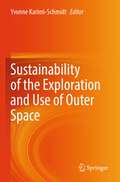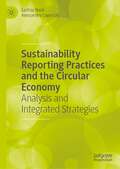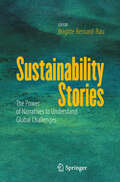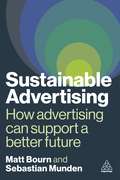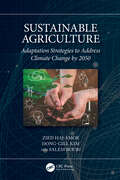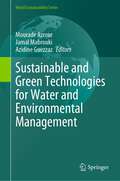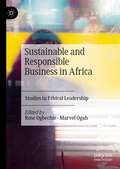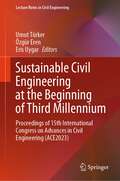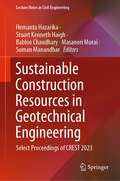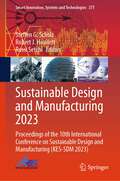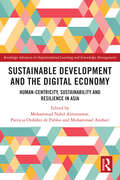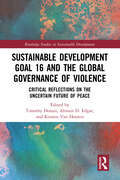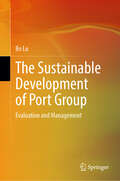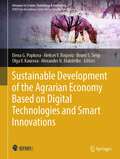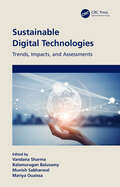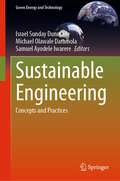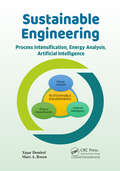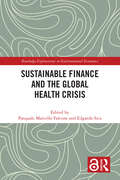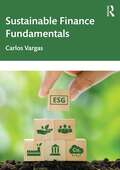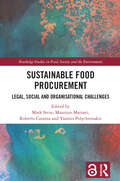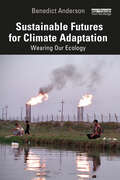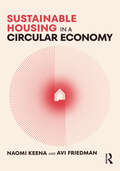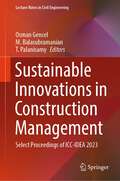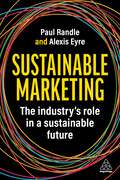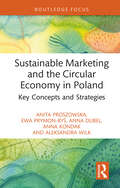- Table View
- List View
Sustainability of the Exploration and Use of Outer Space
by Yvonne Karimi-SchmidtThis book provides insight into the significance of the law of outer space in promoting order, cooperation, and peaceful activities in space. It emphasizes the advantages of having a legal framework in place to govern space exploration and utilization, rather than relying on power and force.
Sustainability Reporting Practices and the Circular Economy: Analysis and Integrated Strategies
by Sarfraz Nazir Alessandro CapocchiThe Circular Economy (CE) and CE-related approaches are increasingly prominent in corporate strategy, with potential environmental, social, and economic benefits to the organization. However, a comprehensive framework that incorporates CE with governance and reporting practices, providing accurate assessments of CE’s success in achieving sustainability targets and other goals, is not yet in place. This book addresses that gap, analyzing the relationship between CE and sustainable development practices, company performance, and to what extent organizations have disclosed this information in annual reporting practices. It proposes different frameworks to evaluate the environmental, social, and economic impact of CE and how CE might be promoted, disclosed, and accurately assessed in reporting practices. It will be of great interest to researchers and students of sustainable development, governance, accounting, and business economics, as well as practitioners seeking a research-based framework for integrating CE into their business reporting.
Sustainability Stories: The Power of Narratives to Understand Global Challenges
by Brigitte Bernard-Rau"Sustainability Stories" is an impactful book that offers a global perspective on the grand theme of sustainability. Through the lens of practitioners deeply committed to this cause, the book amplifies sometimes unheard voices, inspiring readers from diverse backgrounds to embrace environmental, social, and financial responsibilities. Each contributor, whether an entrepreneur, professor, lawyer, artist, or sustainability expert, acts as a visionary communicator, forging connections and leading by example. Featuring over 30 narratives from countries such as France, Germany, India, Morocco, Spain, Switzerland, and the United States, "Sustainability Stories" is sure to engage an international audience. Through its pages, this book spreads optimism, determination, and a desire for positive societal change. It empowers readers of all ages and educational backgrounds to join the movement toward a sustainable future. By sharing unique insights and experiences, "Sustainability Stories" serves as a catalyst, inspiring individuals to take action and make a difference in their professional practices, communities and lives.
Sustainable Advertising: How Advertising Can Support a Better Future
by Matt Bourn Sebastian MundenSustainable Advertising is a manifesto for the world's advertising industry, a case for change globally: 'to change the way we work and to change the work we make'. This is the book every advertising and marketing professional needs to make every ad a sustainable ad.Sustainable Advertising informs every stage of the advertising process with the expertise required to make advertising more sustainable, future-proofing portfolios, improving productivity, and saving money. Covering the way ads are made and distributed, to the products, services, and behaviours they promote, this book sets out the insights, best-in-class case-studies and practical guidance to accelerate change and ensure the industry is fit for purpose in the face of the climate crisis.This must-read guide sets out a clear action plan for agencies, brands, media owners, tech platforms and individuals. It includes interviews with industry leaders including Unilever, WPP, Google, ITV, Cannes Lions, Meta, Havas, PwC, Tesco, Oxford University's Said Business School, the Advertising Standards Authority and dentsu. Learn how to avoid greenwashing, how to pitch more sustainable behaviour changes to appeal to the most customers and how advertising can make the most positive contribution to the global battle against climate change.
Sustainable Agriculture: Adaptation Strategies to Address Climate Change by 2050
by Zied Haj-Amor Dong-Gill Kim Salem BouriEver-increasing population growth, combined with ongoing climate change signals that agriculture will face great challenges in ensuring global food security by 2050. Additionally, climate change-driven variations in mean sea level, wave conditions, storm surge, droughts, and river flows could have serious effects on agriculture and other sectors. Considering these factors and the extremely high value and necessity of agriculture worldwide, effective adaptation measures underpinned by reliable climate change impact assessments are essential to conserve soil and water resources and ensure food security. Sustainable Agriculture: Adaptation Strategies to Address Climate Change by 2050 provides a thorough examination of these issues, and presents in-depth analysis, practical case studies, and numerous examples of adaptation options throughout for various regions of the world.Features: Presents up-to-date, scientifically robust information on climate change projections in Europe, Asia, America, Africa, and Australia Provides pathways to sustainable agricultural options rather than just defining the climate change issue Includes case studies and practical examples throughout the world Presents a framework by which policymakers can begin implementing strategies for improving agricultural productivity
Sustainable and Green Technologies for Water and Environmental Management (World Sustainability Series)
by Mourade Azrour Jamal Mabrouki Azidine GuezzazThis book introduces a variety of the latest researches that are related to smart devices, machine learning algorithms, and the Internet of things that are applied for a sustainable environment. These recent technologies cover all fields including agriculture, transportation, smart grid, smart building, and others. In addition, IoT has provided an innovative vision that is completely alternative to the conventional methodologies: the new approach comes in the form of a single-component system that can be connected to the network and can incorporate smart policies. As a consequence, the covered subjects encompass smart system design and control, networking and machine learning, environmental monitoring and surveillance, smart meters, authentication and authorization, ensuring private data security, software solutions, and systems, among others. This book covers subjects that are related to the Internet of Things and smart used tools and methods for fighting environmental problems. Therefore, it discusses recent ideas that are not covered by other competitor books. This book is different because it can be a reference for researchers, professionals, and students in both smart thinking and environmental domains.
Sustainable and Responsible Business in Africa: Studies in Ethical Leadership
by Rose Ogbechie Marvel OgahThis book provides a transnational African perspective on business management concerns and business ethics by examining the concepts of responsible business practices and sustainability across sub-Saharan Africa. Covering topics ranging from ethical advertisement to responsible pricing to waste management for sustainable business, it highlights the importance of consciously and deliberately inculcating responsible practices in the creation and operation of business activities within a corporate context to achieve sustainability in African markets. The book employs a case-by-case method for treating issues in responsible business practice and sustainability, with contributions illustrating responsible and irresponsible business practices across various areas of business management. Relevant to the UN Sustainable Development Goals, it will be of great importance to academics and students of responsible business, sustainability, business ethics and African business more broadly. It will also be a helpful guide for professionals and business owners to understand some salient issues in navigating sustainable business practices in Africa.
Sustainable Civil Engineering at the Beginning of Third Millennium: Proceedings of 15th International Congress on Advances in Civil Engineering (ACE2023) (Lecture Notes in Civil Engineering #481)
by Umut Türker Özgür Eren Eris UygarThis volume comprises selected peer-reviewed proceedings of 15th International Congress on Advances in Civil Engineering (ACE 2023) was held in Famagusta, North Cyprus in September 2023. This proceedings covers all disciplines of Civil Engineering classified under six main topics: Construction Management, Hydraulics, Geotechnics, Materials, Structures, Transportation, and Civil Engineering Education. It covers highly diverse research topics including investigation in the areas of innovative materials in concrete production, recycling of waste in the construction industry, fibre reinforced and high strength concrete, soil stabilization, problematic soils of semi-arid and arid regions, deep foundations, staged construction modelling, repair and maintenance of reinforced concrete, earthquake engineering and seismic retrofitting, coastal and harbour engineering, water resources management, hydrology & hydraulics engineering, traffic engineering and urban transport, life cycle cost analysis, decision making strategies.
Sustainable Construction Resources in Geotechnical Engineering: Select Proceedings of CREST 2023 (Lecture Notes in Civil Engineering #448)
by Hemanta Hazarika Stuart Kenneth Haigh Babloo Chaudhary Masanori Murai Suman ManandharThis book presents select proceedings of the 2nd International Conference on Construction Resources for Environmentally Sustainable Technologies (CREST 2023), and focuses on sustainability, promotion of new ideas and innovations in design, construction and maintenance of geotechnical structures with the aim of contributing towards climate change adaptation and disaster resiliency to meet the UN Sustainable Development Goals (SDGs). It presents latest research, information, technological advancement, practical challenges encountered, and solutions adopted in the field of geotechnical engineering for sustainable infrastructure towards climate change adaptation. This volume will be of interest to those in academia and industry alike.
Sustainable Design and Manufacturing 2023: Proceedings of the 10th International Conference on Sustainable Design and Manufacturing (KES-SDM 2023) (Smart Innovation, Systems and Technologies #377)
by Steffen G. Scholz Robert J. Howlett Rossi SetchiThe book consists of peer-reviewed papers presented at the International Conference on Sustainable Design and Manufacturing (SDM 2023). Leading-edge research into sustainable design and manufacturing aims to enable the manufacturing industry to grow by adopting more advanced technologies and at the same time improve its sustainability by reducing its environmental impact. Relevant themes and topics include sustainable design, innovation and services; sustainable manufacturing processes and technology; sustainable manufacturing systems and enterprises; decision support for sustainability; and Industry 4.0 and Intelligent Manufacturing. Application areas are wide and varied. The book provides an excellent overview of the latest developments in the sustainable design and manufacturing area.
Sustainable Development and the Digital Economy: Human-centricity, Sustainability and Resilience in Asia (Routledge Advances in Organizational Learning and Knowledge Management)
by Mohammad Nabil Almunawar, Patricia Ordóñez de Pablos and Muhammad AnshariThe advancement of technology, such as data analytics and artificial intelligence (AI), has led to the birth of Industry 4.0, in which technology seems to be the centre of development. However, as the Covid-19 pandemic created havoc, the entire world production chain has been seriously affected, highlighting that machines alone, although fully connected and automated, cannot function without people. This book addresses the pillars of moving towards Industry 5.0 for sustainable development, drawing on examples from Asia. As Asian nations are moving fast toward the digital economy, this edited collection offers new perspectives on understanding emerging business opportunities as well as the challenges faced. Chapters span the three pillars of Industry 5.0, human centricity, sustainability and resilience, and includes topics related to people management for creating wealth, technology advancements in supporting creativity, resilience and agility of organisations, as well as the important issue of sustainability in future industrial development. With rich, empirical studies from leading researchers, this book will be a reference for academics and scholars across business disciplines, including information, technology and innovation management, organisational and strategic management, as well as those interested in industrial development and sustainability.
Sustainable Development Goal 16 and the Global Governance of Violence: Critical Reflections on the Uncertain Future of Peace (Routledge Studies in Sustainable Development)
by Timothy Donais Alistair D. Edgar Kirsten Van HoutenThis book brings together a diverse range of scholars and practitioners working at the nexus of peace and development to reflect, at the mid-way point of the Sustainable Development Goals implementation period, what impact Goal 16 has made, or may yet make, toward reducing violence in ‘all its forms.’ Adopted in 2015, the Sustainable Development Goals include 17 objectives designed to shape and direct the global development agenda through to 2030, with Goal 16 aiming to promote ‘peaceful and inclusive societies for sustainable development.’ Amidst an ongoing global pandemic, evidence of a fracturing liberal international order, and the persistence of seemingly intractable conflict in large parts of the world, this volume takes stock of current progress toward providing access to justice and ensuring inclusive and democratic institutions. Across 15 chapters, the book’s contributors explore the universal aspirations of Goal 16 and its specific implications for conflict-affected states, which continue to experience ‘development in reverse,’ and for historically marginalized groups such as women, youth, the disabled, and indigenous peoples. In doing so, it offers a comprehensive assessment of Goal 16’s broader contribution to the creation of a more just, peaceful world against the realities of societies emerging from the COVID-19 pandemic and grappling with a deepening climate crisis. This volume will appeal to scholars, researchers, policymakers, and postgraduate students in sustainable development, global governance, international relations, global development, international law, and political science.
The Sustainable Development of Port Group: Evaluation and Management
by Bo LuThis book primarily focuses on the coordinated development of port groups and the environment. It extensively reviews relevant literature and draw on existing theoretical research achievements to analyze the mechanisms and influencing factors behind the formation of green, ecological, or energy-saving ports. It employs attribution decomposition analysis and LMDI decomposition methods to identify driving forces and factors for low-carbon ports. Furthermore, with the goal of minimizing the comprehensive cost of low-carbon port investment and considering constraints such as the upper limit of low-carbon investment in ports, the book utilizes tools such as stochastic processes and optimization decision theory to establish an optimization model for carbon emission reduction investment in low-carbon ports, aiming to find the best investment solution. Throughout the process, the book employs a combination of quantitative and qualitative analysis methods and provides corresponding recommendations and suggestions from an industry and port perspective through comparative analysis and case studies.
Sustainable Development of the Agrarian Economy Based on Digital Technologies and Smart Innovations (Advances in Science, Technology & Innovation)
by Elena G. Popkova Aleksei V. Bogoviz Bruno S. Sergi Olga V. Kaurova Alexander N. MaloletkoThis book elaborates on the modern experience and prospects and the development of recommendations for sustainable development of the agrarian economy based on digital technologies and smart innovations for the provision of food security. This book dwells on the global and regional challenges for food security and answers to them through the sustainable development of the agrarian economy. The book also studies the international experience of sustainable development of the agrarian economy on the basis of digital technologies and advantages for food security. Sustainable development of the agrarian economy with the use of digital technologies—as the foundation of food security of Central Asia—is considered. The prospects for provision of food security through the use of smart innovations for the sustainable development of the agrarian economy are outlined. A set of applied recommendations for raising the effectiveness of the use of smart innovations for the sustainable development of the agrarian economy is proposed.
Sustainable Digital Technologies: Trends, Impacts, and Assessments
by Vandana Sharma, Balamurugan Balusamy, Munish Sabharwal, and Mariya OuaissaThis book is a reference on digital technology and its impact on sustainability, providing insight into sustainable practices globally. It focuses on the critical practices leading to sustainable initiatives among various organizations, IT infrastructure, communities, and government compliance. The book describes the green computing paradigms and the impact of a circular economy with a focus on sustainable practices in a post-pandemic world. Sustainable Digital Technologies: Trends, Impacts, and Assessments discusses the critical factors leading to sustainable initiatives in a global economy. It highlights the impact of digital technology and Industry 4.0 in today’s world. The book focuses on the role, responsibility, and the effect of the Internet of Things for digital sustainability and practices. It describes implementation strategies for green cloud computing and presents additional strategies for sustainable practices in a post-pandemic world. This publication is designed for use by technology development academicians, data scientists, industrial professionals, researchers, and students interested in uncovering the latest innovations in the field and the current research on problem-oriented processing techniques in sustainable and evolutionary computing applications with reduced energy channelization.
Sustainable Engineering: Concepts and Practices (Green Energy and Technology)
by Israel Sunday Dunmade Michael Olawale Daramola Samuel Ayodele IwarereSustainable Engineering: Concepts and Practices provides insights into current perspectives on sustainable engineering research. It highlights the drivers, motivations, and challenges affecting the development and adoption of sustainable engineering in various sectors of the economy and how they impact sustainable development. Contributions from researchers representing multiple branches of engineering in academia, government laboratories, and industry present alternative approaches to traditional engineering practices. These approaches effect change, making the design, construction, production, and management of products, processes, and systems more environmentally friendly, socially beneficial, and economically profitable. The book will be a trusted reference for graduate students, practicing engineers, and other professionals interested in developing or using sustainable products and systems.
Sustainable Engineering: Process Intensification, Energy Analysis, and Artificial Intelligence
by Yasar Demirel Marc A. RosenSustainable engineering is of great importance for resilient and agile technology and society. This book balances economics, environment, and societal elements of sustainable engineering by integrating process intensification, energy analysis, and artificial intelligence to reduce production costs, improve the use of material and energy, product quality, safety, societal well-being, and water usage. The book provides comprehensive discussion of topics on process intensification, energy analysis, and artificial intelligence that include optimization, energy integration, green engineering, pinch analysis, exergy analysis, feasibility analysis, life cycle assessment, circular economy, bioeconomy, data processing, machine learning, expert systems, digital twins, and self-optimized plants for sustainable engineering.
Sustainable Finance and the Global Health Crisis (Routledge Explorations in Environmental Economics)
by Pasquale Marcello Falcone Edgardo SicaThe speed with which the various economies recover from the Covid-19 pandemic will significantly determine the economic pressure placed on the environment in the medium-to-long-term. Furthermore, the pandemic has highlighted the strong interrelations between natural and societal systems, with societal resilience depending on a resilient environmental support system. In this context, the book argues that the pandemic represents a wake-up call for financial systems to be better prepared for the climate crisis and social risk, and has provided a stimulus to scale down the reliance of the global economy on fossil fuels. The first part of the book provides a deep and creative discussion between leading international researchers and experts on the policy options and financial instruments which can help to catalyze the green finance transition in the post-Covid-19 era. The contributions show that sustainable finance is emerging as a powerful tool to advance the transition towards a more environmentally and socially sustainable economic model. Instruments such as sovereign green bonds, green securities, and other sustainability-related securities can play a significant role in the post-Covid-19 world to fund economic stimulus and to lead the way to new and more sustainable future. The second part of the book supports the debate by highlighting a number of selected case studies on financing transitions in different regional contexts including Africa, Asia, Europe, and Latin America. The book marks a significant contribution to the literature on environmental economics and finance, climate change, and sustainability transitions.
Sustainable Finance Fundamentals
by Carlos VargasSustainable Finance Fundamentals provides an accessible overview of this critical, rapidly growing area at the intersection of finance and sustainability. The first part showcases different approaches to sustainable finance, covering banking, impact investing, integrated reporting and strategy, and risk management. The second part covers investing, including equity, green bonds, and crowdfunding. In the final part, issues beyond sustainable finance, such as alternative investments, renewable energy, and innovation, are explored. In addition, two optional appendices provide useful introductions to the time value of money (TVM) and financial statements. Ethical and regulatory issues are addressed holistically throughout the book and sustainable finance is linked to related topics, such as environmental economics and the UN Sustainable Development Goals. Each chapter has an international focus and features examples, "in a nutshell" summaries, and discussion questions. Whether you are a student or professional, Sustainable Finance Fundamentals is essential reading for anyone looking to gain a comprehensive understanding of sustainable finance, impact investing, and related areas. Lecture slides and teaching notes are also available for instructors, making this book an ideal text for courses on sustainable finance.
Sustainable Food Procurement: Legal, Social and Organisational Challenges (Routledge Studies in Food, Society and the Environment)
by Mark Stein Maurizio Mariani Roberto Caranta Yiannis PolychronakisThe book examines sustainable food procurement policy and practice in the European Union and beyond, exploring the extent to which sustainability objectives have been achieved and evaluating the new developments taking place at both EU and national levels.While there is a growing recognition that public authorities can use public procurement as a policy tool to pursue multiple environmental, health and socio-economic objectives, contracting authorities still face many challenges. This volume investigates the scope for pursuing sustainable objectives in public procurement of food and catering services, examining different regulatory contexts and organisational models to answer the overall question of how to integrate sustainability concerns into the various phases of public food procurement processes. Contributions in the book examine the policy and legal procurement framework and practices for sustainable public catering in three EU Member States: Italy, France and Spain. There is a comparative survey of the Baltic Region, including Denmark, Estonia, Finland, Poland and Russia, and moving beyond the EU, there is examination of the UK and Brazil, as well as a cross country comparison of the UK with Denmark and Sweden. Drawing on the expertise of an interdisciplinary and intersectoral team of contributors allows the book to benefit from the insights of different disciplines, including business sciences, anthropology and law. Tapping into the global discussion on public food procurement as a means to achieve multiple social and environmental goals, this work will stimulate readers looking for new creative ways to create value through public food purchasing.This book will be of great interest to students, researchers, policymakers and public- and private-sector representatives interested in public procurement, food policy and law, sustainable food sourcing and supply chain management.
Sustainable Futures for Climate Adaptation: Wearing Our Ecology
by Benedict AndersonConsidering sustainability as a flawed and restrictive term in practice, Sustainable Futures for Climate Adaptation argues that we must radically adapt humanity and reform society, cities, buildings, and our approach to migration in order to coexist in harmony with our natural environments. The book conceives an Earth–human coexistence where the world’s regions are shared globally between all people, in contrast to a reality where we have lost touch with the natural world. It is this decoupling of humanity and nature that has brought us to the brink of climate disaster. In response, Benedict Anderson explores the concept of ‘wearing our ecology’, where human mobility is synchronized with the environment, merging people with landscapes, topographies, and geographies. Anderson argues that we need to create new migration routes for people moving between the Global South and North and establish flexible and adaptive living environments. Only by rethinking separations between urban and rural, resource extraction and consumption, racial prejudice and accessibility are we able to forge a closer partnership with nature to adapt to climate change and mitigate the worst of its effects. Touching on themes of adaptive urban design, racial and gender segregation and inequality, and climate apocalypticism, this book will be valuable reading for researchers, scholars, and upper-level students in the fields of urban studies, migration studies, human geography, ecology, politics, and design.
Sustainable Housing in a Circular Economy
by Naomi Keena Avi FriedmanThis book relates circular economy principles to housing design and construction and highlights how those principles can result in both monetary savings, positive environmental impact, and socio-ecological change.Chapters focus on three key circular economy principles and apply them to architectural construction and design, namely rethinking of the end-of-use phase of a building and the potential of design-for-disassembly; the role of digitization and data standardization in fostering evidence-based circular economy design decision-making; and presenting space as a resource to conserve, via exploration of the sharing economy and flexibility principles. Beyond waste management and material cycles, this book provides a holistic understanding of the opportunities across the building life cycle that can allow for sustainable and affordable circular housing. With case studies from 13 different countries, including but not limited to the Hammarby Sjöstad district in Sweden, the Circle House in Denmark, Benny Farm in Canada, VMD Prefabricated House in Mexico, and the Deep Performance Dwelling in China, authors pair theoretical frameworks with real-world examples.This will be a useful resource for upper-level students and academics of architecture, construction, and planning, especially those studying and researching housing design, building technology, green project management, and environmental design.
Sustainable Innovations in Construction Management: Select Proceedings of ICC-IDEA 2023 (Lecture Notes in Civil Engineering #388)
by Osman Gencel M. Balasubramanian T. PalanisamyThis book presents the select proceedings of International Conference on Civil Engineering: Innovative Development in Engineering Advances (ICC IDEA 2023). This book covers the latest research in the areas of construction engineering and management, urban planning and design, building energy conservation and green architecture, materials science and engineering, innovation in construction materials, and information technology in civil engineering. The book is useful for researchers and professionals in civil engineering.
Sustainable Marketing: The Industry’s Role in a Sustainable Future
by Paul Randle Alexis EyreBecoming a sustainable marketer is no longer an optional extra. Sustainability has become a necessity for the future, but do you feel confident delivering on this for your clients and customers?Sustainable Marketing is a blueprint for embedding sustainability at the heart of marketing. Exposing the disturbing reality of marketing's current relationship with many of our environmental and societal problems, it challenges the traditional role of marketing, its cultural norms and gross inefficiency. It goes on to present a compelling vision for change and a practical guide for marketing professionals, equipping them with the mindset and tools to transform their daily work and the industry as a whole, into a force for good.This is the perfect guide for marketing and sustainability professionals working through their company's sustainable transformation whilst trying to avoid the pitfalls of greenwashing and carbon myopia. Written by experts who apply their unique framework to the issue, this book takes what may feel like an insurmountable challenge and breaks it down, giving in-depth advice and providing real-world success stories from companies of all sizes including Tony's Chocolonely, The Onlii and AkzoNobel.
Sustainable Marketing and the Circular Economy in Poland: Key Concepts and Strategies (Routledge Focus on Environment and Sustainability)
by Anita Proszowska Ewa Prymon-Ryś Anna Dubel Anna Kondak Aleksandra WilkSustainable Marketing and the Circular Economy in Poland outlines the specific challenges around formulating an organisation's marketing strategy in line with the circular economy (CE) framework.This book helps to solve the problem of ineffective pro-environmental programmes and marketing tools, which are currently used by enterprises to make their activities more sustainable. The authors identify key concepts and strategies of sustainable marketing to highlight the trends and development directions of marketing activities of modern enterprises. Focussing on Poland as a central case study, the book is illustrated with examples of organisations that are implementing sustainable marketing activities that are compatible with the CE model. It also presents the results of studies which examined the pro-environmental marketing efforts of small- and medium-sized enterprises, non-governmental organisations and other actors in Poland. To conclude, the authors put forward recommendations for CE network stakeholders regarding sustainable marketing management, focussing specifically on how to avoid accusations of greenwashing and other unethical organisational behaviour.This book will be of great interest to students and scholars of green marketing, sustainable business and the CE, as well as entrepreneurs and business professionals looking to formulate sustainable marketing strategies.
